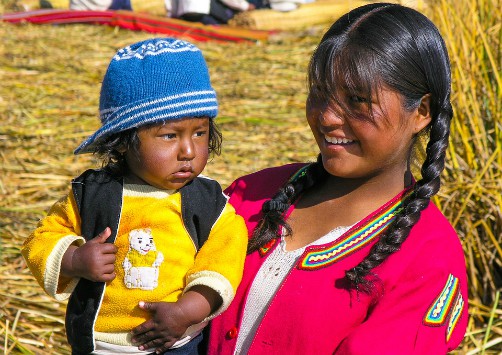Our hundreds of Bolivian traditions would be difficult to summarize on a single page. Bolivian culture has been influenced by over 30
native ethnic groups and numerous immigrant (foreign) cultures and each has contributed its own beliefs and lifestyles to the potpourri of Bolivian customs and traditions. This is precisely what makes Bolivia one of the most colorful nations in South America.
A common misconception is that Bolivia culture and customs are very homogeneous. Most people picture Bolivia as an Andean country because the government has historically projected only the Aymara and Quechua cultures in massive tourism marketing efforts. Though these two Andean ethnic groups are very large and they are very intent upon preserving their traditions, the true culture of Bolivia includes many others.

The same occurs with what is most commonly known about Bolivian history. When the Spanish arrived they focused all their development efforts on the Western Bolivian highlands as their only interest in the region was extracting silver from mines in Potosí and Oruro for shipment to Spain. Meanwhile, the North (Pando) and the vast Eastern and Southern portions of the country (Beni, Santa Cruz and Tarija) remained virtually abandoned. Efforts to promote the tourism and the Bolivian traditions and cultures of this region began just a few years ago with the creation of several important national parks.
Because of this, most of what is known about Bolivia culture and customs reflects the Andean region’s traditions and lifestyle. In fact, Bolivia has many interesting other cultures, each with its own belief systems, legends and stories, clothing and dress styles, dance and music types, art and handcrafts, holidays and festivals. To get the whole picture about Bolivian traditions and customs see the sections below:
Bolivian myths and legends
Bolivia has at least 36 cultures and each has their own history, beliefs, language and origin. Most interesting however, are the hundreds of exceptional myths and legends, some of which are based on historical events, and others on fantasy.
Bolivian sports and athletes
Like most South American countries, Bolivia has a very strong soccer tradition. It is so ingrained in society that businesses often close for major soccer games! There are many other sports in Bolivia too. And there’s a page on famous Bolivian athletes.
Bolivian games and recreation
See some of the typical games played in Bolivia, especially during traditional festivals, and usually accompanied by typical music and dancing.
Traditional Bolivian foods and recipes
See this collection of Bolivian food recipes, read about our food customs and meal times, and be sure to read about typical dining etiquette. It’s very interesting.
Typical Bolivian music types and dances
Music and dance are among the most colorful Bolivian traditions and what Bolivia is best known for overseas. Each Bolivian music type and each typical dance has a specific meaning and purpose. Meet some of our famous musicians.
Bolivian clothing and traditional dress
With over 30 indigenous cultures and many immigrant cultures living here, Bolivia clothes and fashion vary greatly from one region to another. If you know something about Bolivian hats, you can even tell where a person is from!
Bolivian museums and galleries
In Bolivia art is one of the most important Bolivian traditions. Each indigenous group has its own style and modern art is also very popular. Meet some of the most famous Bolivian artists and see a list of museums and galleries. Also see our page on famous Bolivian artists.
Indigenous and modern Bolivian houses
Because there are so many different cultures in Bolivia, there is no such thing as a typical Bolivian house. But several of our cultures have some very interesting building styles. Also, read about modern Bolivian homes.
Native Bolivian cultures and their customs
There are over 30 native Bolivian cultures in Bolivia. Read about each one here. The Bolivian population is also a mix of many immigrant cultures from North America, Europe, Africa, the Orient and the Middle East.
Bolivian holidays, festivals and special occasions
You’ll learn the most about Bolivian traditions by reading about the many festivities and events that are celebrated throughout the nation. Each culture has its own and there are many national holidays as well.
Bolivian schools, education and teachers
Learn about our public and private school systems, Bolivian traditions in the classroom, what it’s like to be a foreign exchange student in Bolivia, the important role of institutes in our education system, universities, and more.
Bolivian social customs, etiquette and lifestyle
From how to dress for dinner to why Bolivians don’t open the gifts you give them, why Bolivians kiss each other all the time, why it’s OK to eat during business meetings, and many other odd Bolivian traditions.
Celebrities and famous people from Bolivia
Celebrities and famous personages, historical characters and others mark trends in any society and Bolivia is no exception. Read about famous writers, philanthropists, musicians, artists, writers, teachers and more.
Fun facts and interesting Bolivia trivia
More can be learned about Bolivian traditions in our trivia sections. Learn why Bolivians wear different colored underwear at New Years or why things get pretty interesting in Bolivia around election time!
Shopping and bargaining customs
Did you know there are even certain Bolivian traditions regarding shopping? Visitors are often surprised to find that haggling prices is a common custom, along with other interesting shopping customs.
Business customs in Bolivia
There are certain social norms and business etiquette you should be aware of if you plan to work in Bolivia or do business in or with Bolivia. Knowing them can make the difference between making or breaking a deal.





